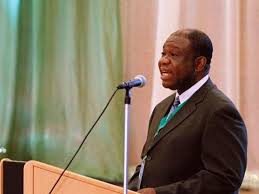Barely four days after the federal government announced that for the first time in Nigeria’s history, it was generating 4,600 megawatts (MW) of electricity, the Minister of Power, Professor Chinedu Nebo, on Monday said the country was still losing 4,700MW due to the unavailability of gas to fire 7,800MW space capacity.
Speaking in Lagos at the pre-conference workshop of the 32nd annual conference and exhibition of the Nigerian Association of Petroleum Explorationists (NAPE), Nebo said of the 7,800MW available in the gas-fired power plants, the gas plants in the Niger Delta provide only 880 million standard cubic feet per day (mmscf/d) of gas to fuel the generation of 3,100MW daily. Before the recent 4,600MW-peak, the country’s highest electricity output was recorded on December 23, 2012 at 4,517.6MW. According to Nebo, 1.9 billion cubic feet per day of gas (bcf/d) would be required to generate the 7,800MW available capacity, adding that with the 880mmscf/d gas that is available, there is a gas supply deficit of one billion cubic feet per day.
Nebo, who spoke on “The Challenges to Developing Sustainable IPP Projects in Nigeria”, reiterated that Nigeria’s current daily power output was about 4,000MW but 3,100MW of this is fuelled by about 880mmscf/d of gas. “With the number of households in Nigeria put at 29 million, at an average consumption of 1 MW for some 500 homes, a maturing electricity supply industry in Nigeria should be producing some 60,000 megawatts (60 gigawatts) of power for household consumption every day. Of these, some 42,000MW should be fuelled by gas,” he said.
The minister, who was represented by his Senior Special Assistant, Power and Gas, Mr. Frank Edoziem, said the opportunity for gas-fuelled IPPs stood at roughly 39,000MW for which about 11 billion cubic feet per day of gas would be required. He noted that addressing the shortfall in gas supply and growing it to meet the anticipated demand would require different approaches to the exploitation of available gas resources.
“The recent announcement of a new pricing regime for domestic gas to power has opened up a new vista for the production of gas for domestic consumption. “We now need to look more at the exploitation of non-associated gas. This means that in addition to our traditional sources in the prolific Niger Delta region, we need to look farther afield at marginal fields and the inland basins including the Anambra and Bida basins and the Benue trough. “In other words, our gas growth needs power to be met through dedicated gas developments targeted at producing gas for power,” Nebo explained.
On the delay in the declaration of the much-awaited Transitional Electricity Market (TEM), Nebo explained that a few conditions precedent for the declaration of TEM were yet to be fully met. According to him, the federal government and other relevant stakeholders are working to ensure the outstanding conditions precedent are met, adding that the TEM would automatically kick in the contractual obligations of all market participants. He advised the new investors in the power sector to immediately begin the implementation of their respective business plans to reduce losses and recover unutilized capacities.
In her speech, the President of NAPE, Mrs. Adedoja Ojelabi, said recent studies had shown that the economic loss to the country due to gas flaring could range between $2.5 billion and $17 billion annually. She acknowledged that some reduction in flaring had been achieved, down from the initial 100 per cent to about 11 per cent in recent times. “However, this is deemed slow over time and a zero flare-out is yet to be achieved. Nigeria still flares about 2 bcf/ day and is ranked among some of the highest gas-flaring countries in the world, with Russia and Iraq. “There are still over 100 flare sites in the Niger Delta region and Nigeria is the highest emitter of greenhouse gas in Africa,” she said.




